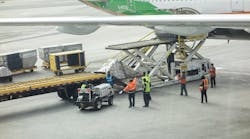Asia-Pacific Aviation Poised for Major Growth by 2028
The aviation business is projected to experience a global increase over the next four years. As Martynas Grigas, CEO of Avia Management Group Asia – Holding Company, explains, Asia is a particularly fertile market for growth.
The international passenger market has recovered significantly in 2023, with the Asia-Pacific region showing the largest passenger recovery. Since there is still a high demand for international air travel, Asian airlines have a generally bright future. Most of destinations in this region are undergoing major changes, even if the majority of Asia Pacific locations are recovering quickly and becoming close to their pre-pandemic number of flights. Understanding these trends is crucial for taking steps for future growth relative to the overall region.
"Countries like Japan, China, Thailand, India, and Indonesia are seen as potential markets with diverse projections for the aviation industry's development. This growth will also influence neighboring countries," he says.
For example, in Southeast Asia, Thailand, supported by both the government and the private sector to realize the Thailand Vision 2030, aims to become a hub for the Asia-Pacific region by renovating six of the country’s major airports and boosting international flights.
"Indonesia is also aligned with this mission to increase the number of international and domestic visitors post-pandemic during the recovery period and tourism business development," Grigas notes. Despite various challenges in 2023, based on the data from Indonesia National Air Carriers Association (INACA) Indonesia achieved an 89% recovery rate in aviation.
"One of the general needs that must be immediately addressed is the ACMI (Aircraft Crew Maintenance and Insurance) business. Looking at what is happening in Indonesia and some neighboring countries with a continuously trending positive increase in passenger numbers, one of the main challenges is the availability of aircraft, which has slowed the recovery rate," Grigas adds.
Avia Management Group Asia Holding Company aims to develop an aviation ecosystem network focused on ACMI business, making it easier for customers to access high-quality flight services. This plan is being put into action to address the rising need for aviation services in the Asia-Pacific region, where demand is continuously on the rise.
Avia Management Group Asia Holding Company manages BBN Airlines Indonesia, Thai SmartLynx, and Avion Express Philippines, all of which specialize in offering ACMI business services. These AMGA (Avia Management Group Asia) affiliates are focused on meet to the APAC market with a one-stop solution for aviation services.
As Grigas explains, the ACMI business model is especially well positioned to support the needs of the Asia-Pacific region in the aviation industry. Avia Management Group Asia, which has experience with this business model, is striving to be involved in the industry's evolution. "The business outlook until 2028 in the Asia-Pacific makes optimistic about the ACMI business model, which is currently our focus," says Grigas.
One of the sub holding in AMGA, BBN Airlines Indonesia in the Asia-Pacific is currently working to meet the Indian market, which is also on a mission to rank among the top three domestic aviation markets globally. "India is pursuing this goal end-to-end, increasing everything from the number of airports and airlines to the number of passenger aircraft. It is also part to support India's mission to develop its aviation industry over the next 20 years " says Grigas.
"The positive business trend in the Asia-Pacific region naturally comes with several global challenges, such as geopolitical turbulence, logistics issues stemming from conflicts in Ukraine and the Middle East, fluctuating inflation, and the rising scarcity of spare parts," Grigas points out.
According to Grigas, these issues should be a concern for all aviation stakeholders in the Asia-Pacific. However, there is much to be positive about. "With the presence of a supportive business ecosystem, infrastructure between countries, and a balanced supply and demand, the targets of Asia-Pacific countries will be achievable," Grigas concludes.





